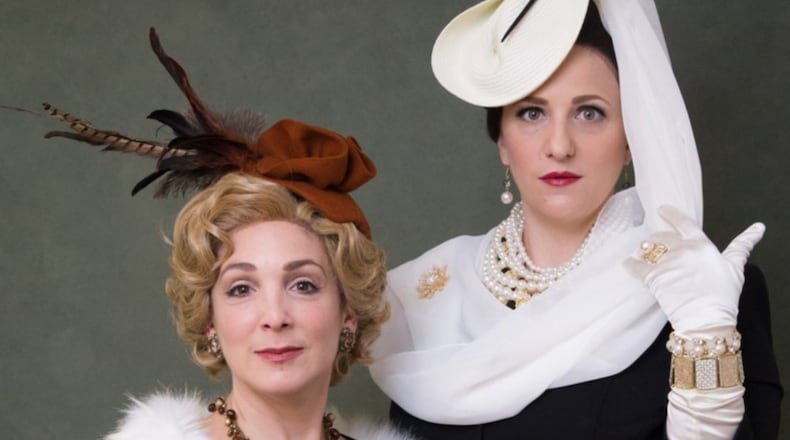On the surface, at least, Atlanta Lyric Theatre’s “War Paint” is an ambitious regional premiere of the 2017 Broadway musical about the professional rivalry between cosmetics icons Helena Rubinstein and Elizabeth Arden. The beauty of director Susan G. Reid’s Lyric production might rest in the eye of the beholder, ultimately, but it’s an undeniably bravura showcase for two polished performers nonetheless: Lyric artistic director Mary Nye Bennett as the flashier Rubinstein, and Pamela Gold as the more reserved Arden.
Among the first and only women entrepreneurs in a business world dominated by men, their highly competitive careers spanned decades — although legend has it that they never actually met. Indeed, until an imagined chance encounter between them at the end of the show, their parallel stories and musical numbers unfold and overlap from opposite sides of scenic designer Stephanie Polhemus’ sleek set. (Doug Wright wrote the script, and the songs feature music by Scott Frankel and lyrics by Michael Korie.)
From the beginning, in the mid-1930s, their aesthetic philosophies and business practices often conflicted and diverged. While Arden espoused the “grace and purity of femininity,” Rubinstein promoted the “science behind the makeup.” During World War II, Arden catered to a new clientele of sophisticated WACs, while Rubinstein targeted working-class Rosie the Riveters.
During the 1950s, they faced some of the same corporate challenges, specifically involving Congressional hearings and FDA rulings about divulging “trade secrets” by listing the ingredients of their products. Both of them shortsightedly disregarded the advent of television, too, as unworthy of their advertising attention. They may have started out ahead of their time, but by the early 1960s, they had become sorely out of touch with it.
They were also plagued with similar problems in terms of balancing their careers and their personal lives. Vaguely estranged from her husband, two sons and an extended family back in her native Poland, Rubinstein’s entrusted right-hand man, Harry Fleming (a miscast Brian Kurlander), eventually abandoned her to take a job with Arden. Interestingly, Arden’s womanizing husband and second-in-command, Tommy Lewis (a solid Lowrey Brown), followed suit by leaving her to go work for Rubinstein.
Reid’s two co-stars are very evenly matched in a musical sense, and although there are several other big chorus numbers in the show, “War Paint” comes alive most memorably in their songs — in their respective solos (Bennett’s “Now You Know” and “Forever Beautiful,” Gold’s “Better Yourself” and “Pink”), as well as a few shared duets (“My American Moment,” “Face to Face,” “Beauty in the World” and especially the wistful “If I’d Been a Man”). Music director Bethany Irby leads an eight-piece band that lacked a certain lushness on opening night.
In a dramatic sense, decked out in Daniel Barr’s overly ostentatious costumes (and an extravagant amount of bling), Bennett would seem to have an advantage playing the flamboyant Rubinstein, what with the thick Polish accent and all the histrionic mannerisms. In fact, because the character feels rather devoid of any vulnerability, she fails to generate as much sympathy as Gold’s more relatable (and sensibly dressed) portrayal of Arden.
That the two of them were trailblazers for generations of businesswomen to follow is irrefutable, and yet to consider them pre-feminists might be pushing it. They finally question whether the beauty industry they pioneered liberated women or enslaved them, but “War Paint” doesn’t delve deeply enough to formulate an answer.
THEATER REVIEW
“War Paint”
Through Sept. 1. 8 p.m. Thursdays-Saturdays; 2 p.m. Sundays; 2 p.m. Saturday (August 31 only). $38-$68. Jennie T. Anderson Theatre (at the Cobb Civic Center), 548 S. Marietta Parkway, Marietta. 404-377-9948. atlantalyrictheatre.com.
Bottom line: Fashionable but flawed.
About the Author
Keep Reading
The Latest
Featured


